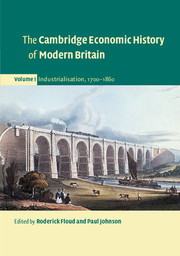Book contents
- Frontmatter
- Chapter1 Accounting for the Industrial Revolution
- Chapter2 Industrial organisation and structure
- Chapter3 British population during the ‘long’ eighteenth century, 1680–1840
- Chapter4 Agriculture during the industrial revolution, 1700–1850
- Chapter5 Industrialisation and technological change
- Chapter6 Money, finance and capital markets
- Chapter7 Trade: discovery, mercantilism and technology
- Chapter8 Government and the economy, 1688–1850
- Chapter9 Household economy
- Chapter10 Living standards and the urban environment
- Chapter11 Transport
- Chapter12 Education and skill of the British labour force
- Chapter13 Consumption in eighteenth- and early nineteenth-century Britain
- Chapter14 Scotland
- Chapter15 The extractive industries
- Chapter16 The industrial revolution in global perspective
- Bibliography
- Index
Chapter15 - The extractive industries
Published online by Cambridge University Press: 28 March 2008
- Frontmatter
- Chapter1 Accounting for the Industrial Revolution
- Chapter2 Industrial organisation and structure
- Chapter3 British population during the ‘long’ eighteenth century, 1680–1840
- Chapter4 Agriculture during the industrial revolution, 1700–1850
- Chapter5 Industrialisation and technological change
- Chapter6 Money, finance and capital markets
- Chapter7 Trade: discovery, mercantilism and technology
- Chapter8 Government and the economy, 1688–1850
- Chapter9 Household economy
- Chapter10 Living standards and the urban environment
- Chapter11 Transport
- Chapter12 Education and skill of the British labour force
- Chapter13 Consumption in eighteenth- and early nineteenth-century Britain
- Chapter14 Scotland
- Chapter15 The extractive industries
- Chapter16 The industrial revolution in global perspective
- Bibliography
- Index
Summary
INTRODUCTION
The story of the industrial revolution is usually told in terms of cotton and the textile industry. But men and women did not live by cloth alone. The houses and factories that they lived and worked in were built with brick and roofed with slate; they were heated, powered and lit by coal and its products; their sanitation and water supply were serviced with lead and copper pipes and cisterns; their tools and machinery were of iron and steel; and their household utensils and facilities were of pottery and ceramics. Whereas in the early 1860s the average annual per capita consumption of raw cotton in mainland Britain was around 30 lb., every man, woman and child in mainland Britain could consume something like 10 oz. of tin, 2 lb. of copper, 6 lb. of lead, over 220 lb. of iron and steel, more than 3 tons of coal, and a similar quantity of clays, sand, stone and gravel. The extractive industries were widely dispersed across the country and dominated a number of regional economies, not just in the north of England. The material culture of everyday life was firmly rooted in the products of the nether world and became ever more dependent on it. No matter how the textile sector grew and expanded, it was the domestic extractive industries, and those that processed their products, that dominated the industrial landscape. Overall, Britain’s mineralogical factor endowment created the defining context for the whole process of its industrialisation. By facilitating and encouraging the substitution of mineral for organic resources it guided technology in new directions that were particularly rich in innovative possibilities.
- Type
- Chapter
- Information
- The Cambridge Economic History of Modern Britain , pp. 417 - 450Publisher: Cambridge University PressPrint publication year: 2004
- 3
- Cited by



